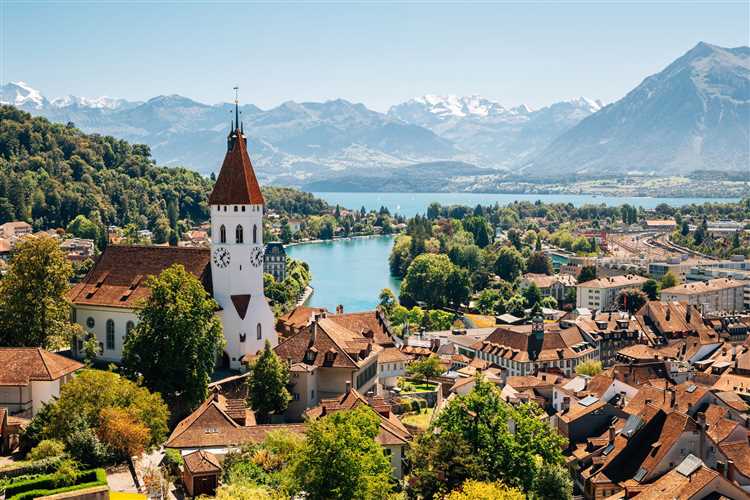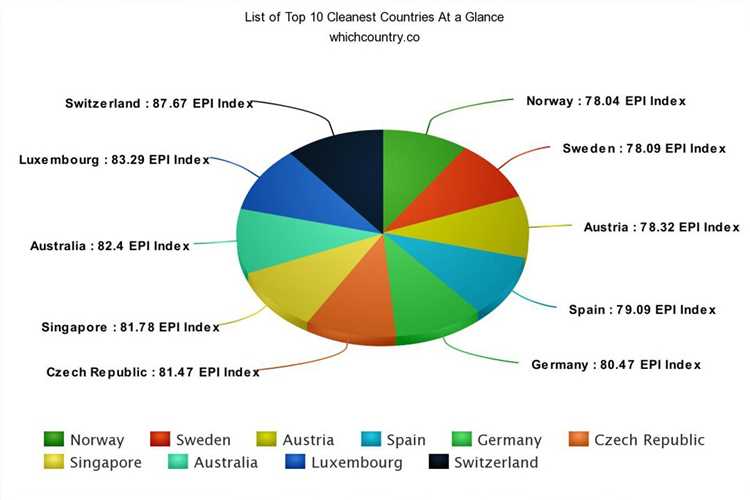
When it comes to cleanliness, there is one country that stands out above the rest. With its pristine landscapes, well-maintained cities, and commitment to sustainability, this country has earned the title of the cleanest country in the world. So, which country is it?
Drumroll, please… The cleanest country in the world is… *drumroll intensifies*… Switzerland! Yes, this small but mighty country in the heart of Europe takes the top spot in numerous cleanliness rankings. But what makes Switzerland so clean? Let’s dive in and explore the reasons behind this remarkable achievement.
First and foremost, Switzerland has a strong culture of environmental consciousness. The Swiss people take great pride in their natural surroundings and go to great lengths to preserve them. From recycling initiatives to strict waste management policies, the Swiss prioritize sustainability in all aspects of their daily lives. This commitment can be seen in the country’s immaculate streets, clear lakes, and breathtaking mountain ranges.
In addition to its environmental efforts, Switzerland also boasts efficient public transportation systems that contribute to its cleanliness. With an extensive network of trains, trams, and buses, getting around the country is not only convenient, but also environmentally friendly. This not only reduces the number of cars on the road and the pollution they emit, but also helps keep the streets clean and free of congestion.
Furthermore, the Swiss government has implemented stringent regulations and standards to ensure the cleanliness of the country. From air quality control to water purity checks, Switzerland has a comprehensive system in place to monitor and maintain its cleanliness. These regulations, combined with the strong emphasis on public cleanliness, have made Switzerland a shining example of what can be achieved when a country prioritizes cleanliness.
In conclusion, Switzerland’s ranking as the cleanest country in the world is well-deserved. By placing a high value on sustainability, investing in efficient public transportation, and implementing strict regulations, Switzerland has created an environment that is not only pristine, but also serves as a model for other countries striving to achieve cleanliness.
- What Makes a Country Clean?
- Government Policies and Regulations
- Education and Awareness
- Infrastructure and Waste Management Systems
- Rankings
- 1. Finland
- 2. Iceland
- Top Cleanest Countries in the World
- Iceland
- Switzerland
- New Zealand
- Austria
- Factors Considered in Rankings
- Reasons for Cleanliness
- Government Initiatives
- Environmentally Friendly Policies
- National Level Policies
- Local Level Initiatives
- Q&A
- Is Singapore the cleanest country in the world?
- What are the reasons behind Singapore’s cleanliness?
- Are there any penalties for littering in Singapore?
- How does Singapore manage public cleanliness?
What Makes a Country Clean?
There are several factors that contribute to making a country clean. Here are some of the key elements:
Government Policies and Regulations
One of the most significant factors is the implementation of effective government policies and regulations. A country with strong environmental laws and regulations can ensure that industries and individuals follow proper waste management practices, reduce pollution, and promote sustainable development.
Education and Awareness
Education plays a vital role in creating a clean environment. When citizens are aware of the impact of their actions on the environment, they are more likely to take steps towards conservation. Raising awareness about the importance of recycling, reducing waste, and preserving natural resources helps in building a sustainable and clean society.
Infrastructure and Waste Management Systems

Having a robust infrastructure and efficient waste management systems is crucial for maintaining cleanliness. Proper waste disposal facilities, recycling programs, and efficient public transportation systems contribute to reducing pollution and waste accumulation.
Public Participation
An engaged and responsible public is essential for keeping a country clean. When individuals actively participate in clean-up campaigns, waste segregation, and sustainable practices, it significantly helps in maintaining cleanliness and preserving the environment for future generations.
In conclusion, a combination of government policies, education, infrastructure, and public participation is what makes a country clean. Taking proactive measures towards environmental conservation is the key to ensuring a clean and sustainable future.
Rankings
When it comes to ranking the cleanest countries in the world, there are several factors that need to be taken into consideration. These factors include air quality, water quality, waste management, and overall environmental policies and practices. Various organizations and publications have created their own rankings based on these factors to determine which countries are leading the way in terms of cleanliness.
1. Finland
Finland consistently ranks as one of the cleanest countries in the world. It has stringent environmental regulations and extensive waste management systems in place. The country is known for its commitment to sustainability and has implemented various initiatives to reduce air and water pollution.
2. Iceland
Iceland is another country that consistently ranks high in cleanliness rankings. The country’s dedication to renewable energy sources, such as geothermal and hydropower, contributes to its clean environment. Additionally, Iceland has strict environmental regulations and takes measures to protect its pristine natural landscapes.
Other countries that often appear in cleanest country rankings include Sweden, Switzerland, and Denmark. These countries have implemented effective waste management systems, prioritize renewable energy sources, and have strong environmental policies in place.
It’s important to note that rankings may vary depending on the specific criteria used by different organizations. However, these rankings provide a general idea of which countries are considered to be the cleanest in the world. The top-ranking countries serve as examples of the initiatives and efforts that other countries can adopt to improve their own cleanliness and environmental practices.
Top Cleanest Countries in the World
When it comes to cleanliness, some countries are a cut above the rest. These nations prioritize environmental sustainability and have implemented strict policies and practices to maintain a high level of cleanliness. Here are the top cleanest countries in the world:
-
Iceland
Iceland is often hailed as the cleanest country in the world. With its abundant natural resources and a small population, Iceland has been able to preserve its pristine environment. The country boasts of crystal-clear air, untouched landscapes, and strict regulations on waste management.
-
Switzerland

Switzerland, known for its stunning alpine scenery, is renowned for its cleanliness. The country has a well-developed waste management system, with high recycling rates and efficient garbage collection. Switzerland also has strict laws regarding pollution and environmental protection.
-
New Zealand
New Zealand’s commitment to environmental preservation and sustainability has earned it a spot among the cleanest countries in the world. The nation takes pride in its breathtaking landscapes, pristine beaches, and clear blue waters. New Zealanders are actively involved in environmental conservation efforts, making it a clean and green country.
-
Austria
Austria is known for its picturesque countryside and clean cities. The country emphasizes waste reduction and promotes the use of renewable energy sources. Austrians take their responsibility towards the environment seriously, and it shows in their clean and well-maintained surroundings.
These are just a few examples of the cleanest countries in the world. Each of these nations has made significant efforts to prioritize cleanliness and environmental sustainability, setting an example for others to follow.
Factors Considered in Rankings
When determining the cleanest country in the world, several key factors are taken into consideration. These factors play a crucial role in establishing rankings and evaluating the overall cleanliness of a country:
- Air quality: The level of air pollution, presence of airborne contaminants, and adherence to clean air regulations are important indicators of a country’s cleanliness.
- Water quality: The purity of the country’s water sources, including rivers, lakes, and drinking water, is a significant factor in determining the cleanliness of a country.
- Waste management: Proper waste management practices, such as recycling programs, waste treatment facilities, and effective garbage disposal systems, contribute to a country’s cleanliness.
- Environmental policies: The presence of strong environmental regulations and policies, as well as the commitment to sustainability and conservation, are key considerations when ranking countries based on cleanliness.
- Green spaces: The presence of parks, forests, and other natural areas within a country are indicators of a clean environment and a commitment to preserving natural habitats.
- Renewable energy sources: The reliance on renewable energy sources, such as solar or wind power, demonstrates a country’s commitment to reducing pollution and promoting clean energy.
By carefully examining these factors, experts can determine the cleanest country in the world and provide valuable insights into the measures taken to maintain a clean and sustainable environment.
Reasons for Cleanliness
There are several reasons why a country may become known for its cleanliness. These reasons can include:
|
1. Cultural Values: Some countries place a high value on cleanliness as part of their cultural norms and traditions. This can be seen in the way people approach cleanliness in their daily lives, such as maintaining clean streets, parks, and public spaces. |
|
2. Government Policies: Government policies and regulations that promote cleanliness can greatly contribute to a country’s cleanliness ranking. This can include strict laws related to waste management, pollution control, and public hygiene. |
|
3. Education and Awareness: Education plays a vital role in promoting cleanliness within a country. By raising awareness about the importance of cleanliness and teaching good hygiene practices, individuals are more likely to prioritize cleanliness in their daily lives. |
|
4. Infrastructure and Facilities: Countries with well-developed infrastructure and facilities, such as efficient waste management systems and clean water supply, are more likely to maintain a high level of cleanliness. Easy access to clean facilities encourages individuals to be mindful of their surroundings. |
|
5. Social Responsibility: A sense of social responsibility among individuals can greatly contribute to a clean environment. When citizens take responsibility for their actions and actively participate in efforts to keep their surroundings clean, it creates a positive collective impact on the overall cleanliness of the country. |
Overall, a combination of cultural values, government policies, education, infrastructure, and social responsibility contributes to making a country known for its cleanliness. These factors work together to create a clean and sustainable environment for both residents and visitors.
Government Initiatives
The cleanest country in the world is often defined by the efforts and initiatives taken by its government. A clean environment is not just a result of individual responsibility, but it is also a result of systematic measures taken by the government to promote sustainable living and reduce pollution.
In the cleanest country, the government has implemented various policies and regulations to ensure the cleanliness of the environment. These government initiatives include strict laws on waste management, air and water pollution control, and conservation of natural resources.
One of the key government initiatives is the promotion of recycling and waste separation. Citizens are encouraged to separate their waste into different categories for recycling, composting, and disposal. The government provides recycling facilities and educates the public on the importance of waste separation and its impact on the environment.
The government also invests in advanced waste management systems, such as waste-to-energy plants and landfill technologies. These initiatives not only help in reducing waste but also generate clean energy and minimize the environmental impact of waste disposal.
To tackle air pollution, the government has implemented strict emissions standards for vehicles and industries. It promotes the use of clean energy sources, such as solar and wind power, and encourages the adoption of electric vehicles. The government also monitors air quality levels and takes immediate actions to address any pollution hotspots.
In addition to waste and air pollution control, the government focuses on water conservation and protection. It promotes sustainable water management practices, such as rainwater harvesting and efficient irrigation systems. The government also enforces regulations to prevent water pollution from industrial activities and encourages water reuse and recycling.
Furthermore, the government in the cleanest country emphasizes the importance of preserving natural resources. It implements laws and regulations to protect forests, wildlife, and natural habitats. The government also promotes eco-tourism and sustainable practices in agriculture, fishing, and mining.
Overall, the government initiatives play a crucial role in establishing and maintaining a clean environment in the cleanest country in the world. Through strict regulations, investments in sustainable technologies, and public education, the government ensures that both individuals and industries contribute to a cleaner and healthier environment.
Environmentally Friendly Policies
The cleanest country in the world is known for its strong commitment to environmentally friendly policies. These policies are implemented at both the national and local levels, ensuring sustainable practices and a minimal carbon footprint.
National Level Policies
At the national level, the government has implemented a comprehensive set of policies to protect the environment and promote sustainability. These policies include:
- Strict environmental regulations: The country has stringent regulations in place to control pollution and limit the use of harmful substances.
- Renewable energy promotion: The government has actively promoted the use of renewable energy sources such as wind, solar, and hydropower.
- Investment in green technologies: Significant investments have been made in research and development of green technologies to foster innovation and reduce environmental impact.
- Waste management initiatives: The country boasts effective waste management systems to ensure proper disposal and recycling of waste materials.
Local Level Initiatives
At the local level, cities and communities play a crucial role in maintaining cleanliness and sustainability. Some of the key initiatives taken include:
- Public transportation improvement: The cities have invested heavily in improving public transportation systems, reducing reliance on private vehicles and thus decreasing emissions.
- Promotion of cycling and walking: Bike lanes and pedestrian paths have been created to encourage people to use non-motorized forms of transportation.
- Green spaces and parks: Cities have created and maintained green spaces and parks, contributing to cleaner air and providing a healthy environment for residents.
- Education and awareness programs: Local authorities regularly conduct educational campaigns and programs to promote environmental awareness and encourage sustainable behavior.
Through the combination of strong national-level policies and local-level initiatives, the cleanest country in the world has successfully created a culture of sustainability and environmental consciousness. This commitment has not only resulted in a clean and healthy environment but also serves as an inspiration for other countries to follow suit.
Q&A
Is Singapore the cleanest country in the world?
Yes, Singapore is considered to be one of the cleanest countries in the world.
What are the reasons behind Singapore’s cleanliness?
Singapore’s cleanliness can be attributed to several factors, such as strict laws and regulations, efficient waste management systems, and a strong emphasis on cleanliness and hygiene education.
Are there any penalties for littering in Singapore?
Yes, Singapore has strict laws against littering. Offenders can be fined up to $1,000 for the first offense and up to $5,000 for subsequent offenses. Repeat offenders may also be subjected to community service or corrective work orders.
How does Singapore manage public cleanliness?
Singapore manages public cleanliness through various initiatives, such as regular cleaning schedules, well-maintained public spaces, efficient waste collection and disposal systems, and public campaigns promoting cleanliness and hygiene.